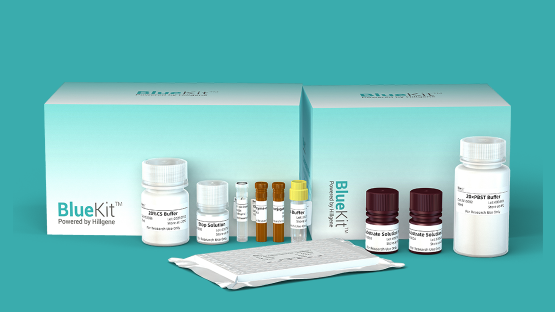Overview of Benzonase Enzymatic Functionality
Benzonase is a versatile enzyme that plays a critical role in the biotechnology sector, particularly in the removal of nucleic acids from biological samples. As a non-specific endonuclease derived from Serratia marcescens, Benzonase effectively cleaves both DNA and RNA molecules. This characteristic makes it invaluable in various applications, such as purifying recombinant proteins and ensuring the integrity of vaccine production processes. Manufacturers and suppliers of biochemical reagents often emphasize the efficiency of Benzonase in degrading nucleic acids without sequence-specific requirements, resulting in its broad-spectrum capability.
Mechanism of Action
Benzonase acts by hydrolyzing the phosphate diester bonds in nucleic acids, producing 5' phosphate-terminated oligonucleotides. The enzyme is highly effective against single-stranded and double-stranded nucleic acids, whether linear, circular, or supercoiled. This ability to reduce nucleic acid contamination is pivotal in processes where nucleic acid residues can interfere with downstream applications.
Applications of Benzonase in Biotechnology
In the biotechnology industry, Benzonase is employed extensively for its nucleic acid degradation capabilities. Its applications span various domains, including vaccine production, where the removal of host cell nucleic acids is crucial to the safety and efficacy of the final product.
Role in Vaccine Production
The pharmaceutical industry relies on Benzonase for its proficiency in diminishing nucleic acid contamination to picogram levels. This ensures that vaccines and other protein-based therapeutics maintain high purity levels. Manufacturers prioritize Benzonase in their production protocols to meet stringent regulatory standards.
Improvement of Filtration Processes
Benzonase not only enhances nucleic acid removal but also aids in reducing the viscosity of cell lysates. This reduction in viscosity promotes more efficient filtration and ultrafiltration processes, leading to improved yield and purity of biological products. Suppliers of bioprocessing equipment often recommend Benzonase to optimize purification workflows.
Understanding Optimal Temperature for Benzonase Activity
Temperature plays a significant role in the functionality and stability of enzymes, including Benzonase. Identifying the optimal temperature for its activity can significantly influence the efficiency of the processes in which it is employed.
Enzyme Kinetics and Temperature
Enzyme kinetics is sensitive to temperature variations, with activity typically increasing with rising temperatures until a peak is reached. Beyond this optimal temperature, the enzyme's activity rapidly declines due to denaturation. For Benzonase, the optimal temperature is often considered to be around 37 degrees Celsius, corresponding to physiological conditions.
Temperature-Dependent Activity of Benzonase
The activity of Benzonase is particularly influenced by temperature, affecting its catalytic rate and stability. Studies indicate that at lower temperatures, the enzyme's activity is reduced, whereas at higher temperatures, the risk of denaturation increases.
Experimental Evidence
In laboratory settings, Benzonase exhibits maximal activity at approximately 37 degrees Celsius. This temperature allows for efficient nucleic acid cleavage while maintaining enzyme stability. Factories specializing in enzyme production often calibrate their processes to sustain this temperature, ensuring consistent enzyme performance.
Role of Temperature in Enzyme Inhibition
While optimal temperatures enhance enzyme activity, they can also influence the susceptibility to inhibitors. Maintaining an optimal temperature is critical in minimizing inhibition effects that could otherwise compromise Benzonase's activity.
Inhibitor Sensitivity
The presence of certain reagents may inhibit Benzonase activity by up to 50% at specific concentrations. However, maintaining the enzyme at its optimal temperature can mitigate these effects, ensuring more reliable performance in industrial applications.
Practical Considerations for Temperature Control in Industrial Processes
Temperature control is crucial for maximizing the efficiency of Benzonase in industrial-scale processes. Both manufacturers and suppliers need to implement robust systems that ensure consistent temperature conditions.
Temperature Monitoring and Adjustment
Regular monitoring of processing temperatures, coupled with automated temperature adjustment systems, can help maintain the enzyme's optimal activity. Factories often invest in advanced temperature control technologies to ensure that their production processes remain efficient and cost-effective.
Experimental Determination of Temperature Optima
Determining the temperature optima for Benzonase involves systematic experimentation, allowing for precise calibration of industrial applications. This ensures that the enzyme's potential is fully harnessed in various biotechnological processes.
Testing Methodologies
Standard experimental protocols involve assessing Benzonase activity across a range of temperatures. Manufacturers typically conduct these assessments during the enzyme development phase to establish the most effective temperature conditions for deployment in various applications.
Comparing Benzonase with Other Endonucleases
Benzonase stands out among endonucleases due to its broad-spectrum activity and temperature resilience, making it a preferred choice among suppliers of enzymatic solutions. Comparative studies help underscore these advantages in diverse applications.
Advantages Over Other Enzymes
Compared to other endonucleases, Benzonase provides superior nucleic acid degradation across a wider temperature range. This versatility is critical for manufacturers seeking reliable and efficient enzymatic solutions for complex bioprocessing challenges.
Future Research Directions in Enzyme Temperature Optimization
Ongoing research continues to refine our understanding of enzyme temperature dynamics, with the goal of enhancing Benzonase's efficiency and stability. This research is essential for maintaining the enzyme's edge in the competitive field of bioprocessing.
Innovations in Enzyme Engineering
Advancements in protein engineering may lead to the development of Benzonase variants with improved temperature stability and activity. By focusing on these innovations, manufacturers and suppliers can offer more effective enzymatic solutions tailored to specific industry needs.
BlueKit Provide Solutions
BlueKit offers tailored solutions to optimize Benzonase activity across various temperature conditions. Our advanced bioprocessing systems ensure precise temperature control, enhancing enzyme efficiency and stability. By integrating state-of-the-art monitoring and adjustment technologies, we help manufacturers and suppliers maintain consistent production quality. Our expertise in enzymatic solutions equips you with the tools needed to address complex bioprocessing challenges, ensuring optimal enzyme performance and product purity.

Post time: 2025-08-01 13:53:28











